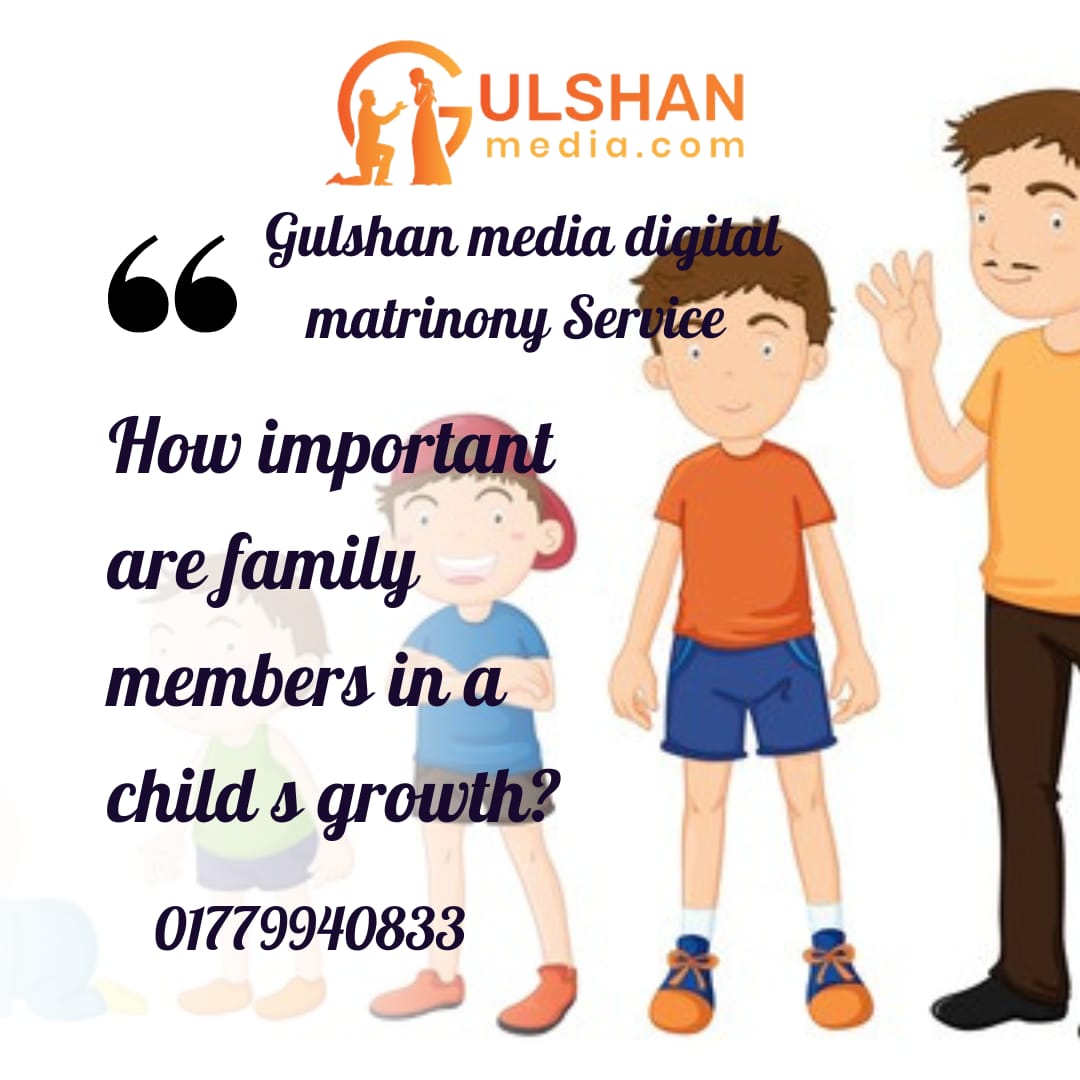How important are family members in a child’s growth?
How important are family members in a child’s growth?
Introduction :
Family is the cornerstone of a child’s upbringing, providing a nurturing and supportive environment for their growth and development. Within the family unit, parents, siblings, and extended family members play crucial roles in shaping a child’s personality, values, and overall well-being. In this article, we explore the importance of family members in a child’s growth, emphasizing the profound impact they have on their emotional, cognitive, and social development.
- Emotional Support and Security : Family members serve as primary sources of emotional support and security for children. Parents, in particular, provide a stable and loving environment that fosters a sense of belonging, trust, and self-worth. Through their unconditional love, parents offer emotional comfort, guidance, and reassurance during challenging times. Siblings, too, play a vital role in emotional development by providing companionship, empathy, and a unique bond that extends throughout a child’s life.
- Socialization and Communication Skills : Family members serve as a child’s first social group, playing a fundamental role in their socialization and communication skills. Interacting with parents, siblings, and extended family members allows children to learn essential social norms, values, and behaviors. Through daily interactions, children develop language skills, empathy, conflict resolution abilities, and the capacity to navigate social relationships. Family gatherings and shared experiences also provide opportunities for children to develop social connections, learn cooperation, and develop a sense of identity and belonging within a broader community.
- Role Modeling and Values Formation : Family members serve as powerful role models for children, shaping their values, beliefs, and moral compass. Parents and older siblings exemplify behaviors and attitudes that influence a child’s sense of right and wrong. Observing positive role models within the family helps children develop empathy, compassion, honesty, and respect for others. Family values, traditions, and cultural practices are passed down through generations, providing a foundation for a child’s sense of identity and belonging.
- Educational and Intellectual Development : Family members contribute significantly to a child’s educational and intellectual development. Parents play a crucial role in fostering a love for learning, supporting academic pursuits, and providing a stimulating home environment. Engaging in educational activities, reading together, and encouraging curiosity and critical thinking helps children develop cognitive skills, problem-solving abilities, and a thirst for knowledge. Siblings can also contribute to intellectual growth by sharing experiences, engaging in imaginative play, and offering peer support in learning endeavors.
- Health and Well-being : Family members have a direct impact on a child’s health and overall well-being. Parents play a vital role in providing a nutritious diet, promoting healthy habits, and ensuring regular medical care. They instill the importance of physical activity and teach self-care routines that lay the foundation for a healthy lifestyle. Additionally, family dynamics and the quality of relationships within the family significantly influence a child’s emotional and mental well-being. A supportive and loving family environment promotes resilience, self-esteem, and positive mental health.
Conclusion :
Family members are central to a child’s growth and development, providing emotional support, socialization opportunities, role modeling, intellectual stimulation, and promoting overall well-being. The love, guidance, and nurturing received from parents, siblings, and extended family members shape a child’s personality, values, and sense of self. Recognizing the significance of family in a child’s life emphasizes the need to foster strong and healthy family relationships, as they provide a solid foundation for a child’s future success and well-being.
How important is the experience of family elders in raising a child?
Introduction :
The experience and wisdom of family elders are invaluable resources in raising a child. Grandparents, great-grandparents, and other elder family members bring a wealth of knowledge, traditions, and life lessons that enrich a child’s upbringing. Their guidance, love, and unique perspectives play a vital role in shaping a child’s character, instilling values, and passing down cultural heritage. In this article, we delve into the importance of the experience of family elders in raising a child, highlighting the profound impact they have on a child’s growth, identity formation, and overall well-being.
- Passing Down Cultural Heritage : Family elders hold a wealth of cultural knowledge and traditions that connect children to their roots and heritage. Through storytelling, sharing family history, and teaching customs and rituals, elders impart a sense of identity and belonging to younger generations. They pass down traditional arts, crafts, music, and cuisine, preserving cultural heritage that might otherwise fade away. The experience of family elders fosters a deep appreciation for cultural diversity and strengthens the child’s understanding of their place within the larger community.
- Life Lessons and Values : Elders possess a vast reservoir of life experiences, offering valuable insights and wisdom to guide children through their journey. Through their stories and personal anecdotes, they share lessons learned from triumphs, challenges, and the passage of time. Elders can impart important values such as resilience, empathy, integrity, and compassion, helping children develop a strong moral compass. Their guidance helps children navigate decision-making, relationships, and ethical dilemmas, instilling a sense of responsibility and guiding them towards a meaningful and purposeful life.
- Intergenerational Bonding and Emotional Support : The bond between grandchildren and their elders creates a unique support system that nurtures emotional well-being. Elders provide a safe space for children to express their feelings, fears, and joys. Their unconditional love, patience, and acceptance promote a sense of security and emotional resilience. The intergenerational connection fosters empathy and respect, teaching children to value the perspectives and experiences of others. In turn, children bring youthful energy, curiosity, and joy to the lives of their elders, strengthening the family bond and creating cherished memories.
- Mentorship and Skill Development : Elders serve as mentors, passing on practical skills and knowledge that are often rooted in traditional practices. From cooking and gardening to craftsmanship and storytelling, they provide hands-on learning opportunities that nurture creativity and self-sufficiency. Children benefit from their elders’ expertise, acquiring skills that connect them to their cultural heritage and may foster future hobbies or careers. Mentorship from family elders also promotes intergenerational learning and strengthens family ties, as children value the time and attention invested in them.
- Fostering Respect and Appreciation for Aging : Through their presence and engagement in a child’s life, family elders teach respect and appreciation for the aging process. Children witness firsthand the wisdom, grace, and vitality that can accompany old age. Elders model the value of lifelong learning, adaptability, and resilience, challenging societal misconceptions about aging. This exposure helps children develop empathy, combat ageism, and develop a positive attitude towards their own aging process. Values and Morals (300 words): The experience of family elders is instrumental in shaping a child’s values and morals. Elders often embody a strong moral compass, exemplifying integrity, compassion, and respect for others. Their wisdom guides children in making ethical decisions and navigating complex moral dilemmas. Elders’ insights into the consequences of past actions help children develop a greater understanding of responsibility and accountability. The guidance of elders fosters empathy and instills in children the importance of treating others with kindness and understanding.
- Wisdom and Life Lessons (200 words): The wisdom acquired by family elders through a lifetime of experiences is an unparalleled source of guidance for a child’s personal growth and development. Elders offer practical advice, drawing from their own triumphs and failures. Their stories and life lessons serve as valuable teaching tools, imparting knowledge that textbooks cannot provide. As children face various milestones and life choices, the perspective of elders helps them navigate life’s complexities with greater clarity and insight.
- Interpersonal Skills and Communication (200 words): The presence of family elders fosters strong interpersonal skills and effective communication in children. Elders often emphasize the importance of active listening, patience, and understanding in family interactions. Through spending time with elders, children learn the value of respectful communication and the art of storytelling. Elders’ ability to share their experiences and empathize with younger generations creates a strong bond that encourages open communication within the family unit.
Conclusion :
The experience of family elders is an irreplaceable asset in raising a child, providing cultural heritage, life lessons, emotional support, and intergenerational bonding. The guidance, wisdom, and love they offer enrich a child’s development, shaping their values, character, and overall well-being. Recognizing the importance of family elders underscores the need to foster strong intergenerational connections and create spaces for meaningful engagement between the young and old. By valuing and embracing the experiences of family elders, we ensure the preservation of traditions, the passing down of wisdom, and the continuation of a legacy that spans generations. The experience of family elders in raising a child is a timeless treasure that enriches a child’s life in profound ways. Their emotional support, cultural knowledge, values, and wisdom lay the foundation for a child’s character and worldview. Recognizing the significance of family elders emphasizes the need to cherish and preserve intergenerational bonds, as they serve as beacons of strength and guidance in an ever-changing world.
“বিয়ে সংক্রান্ত যেকোনো তথ্য ,সেবা এবং পরামর্শ পেতে যোগাযোগ করুন গুলশান মিডিয়ার সাথে। ” কল করুন: 01779940833
Email : gulshanmedia2@gmail.com









